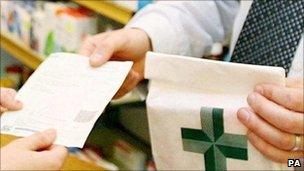Many GPs 'prescribe drugs to addicted patients'
- Published

Abuse of prescription drugs is a fast-growing problem
Almost 80% of GPs routinely prescribe drugs to which they believe the patient may be addicted, a survey suggests.
The Family Doctor Association study suggests abuse of types of sleeping pills, antidepressants, and painkillers is increasing in the UK.
More than half the 197 GPs surveyed said they were worried about the abuse, and called for more research.
The problem is already huge in the US, where an estimated 30,000 died in 2010 from having abused prescription drugs.
Dr Peter Swinyard, chairman of the FDA, said: "Our simple main concern is the patient - nothing else matters.
"But sometimes, somewhat misguidedly, we don't do the right thing.
"We need the research to back up and to prove to GPs as well that there's a problem here we need to address."
Anti-anxiety pills
Rachel Smith, 35, from Malvern, Worcestershire, is among those people who have abused prescription drugs.
She was prescribed Prozac and Diazepam to treat anxiety and depression.
She said: "I wanted to block out what I was feeling. It helped me escape my own head. And where did it lead? To further addiction."
In just one month she was addicted, and soon a weeks' prescription lasted only two days.
No-one in her GP surgery monitored the amount she was taking.
"Then I would ring up the doctor and say I'd lost the prescription and then I'd do the same again," she said.
"No-one said anything because it was an automated system."
However, Ms Smith said it was important that people who knew they were becoming addicted got help as quickly as possible.
"It's a really fast downhill spiral. You might think you're coping, but you're not. It'll get harder and harder."
Nai Duran, 33, from London, became addicted at the age of 17 after being prescribed painkillers for stubbing his toe.
A friend showed him how to crush up pills, snort them, and eventually inject them.
"I would go around clinics, where I would approach someone with crutches and ask them if they had any painkillers.
"They had no problem selling it to me, because they could get a refill - even if it was before the expected time for them to get that refill."
Drugs counsellor Darren Rolfe said he was seeing increasing numbers of people with similar problems. Often people get hooked after being prescribed painkillers following operations.
Mr Rolfe said part of the problem was a lack of stigma: "Going to buy over the counter isn't the same as buying a load of crack cocaine - people can get away with it, you're not going to be arrested.
"I think people sit in their homes at night, knowing they have a problem, but the pride and fear have yet to come to the surface."
No control
Pharmacists said it was difficult for them to control how much is given out.
Shaib Akhtar, a a pharmacy manager at Shire Pharmacy in Birmingham, said: "I used to work in a larger pharmacy, and I would be in one branch and see someone buying something and the next day I was in another branch and see that person turn up to buy the same thing, probably not realising the same pharmacist would be there."
A research paper published in February, the National Treatment Agency for Substance Misuse, said there were "conflicting messages" about where the responsibility for the problem lay, and what should be done about it.
Another major obstacle is the lack of information. There is no centralised software system for recording prescriptions.
With proposed changes to GP practice boundaries, Dr Swinyard believes it could become even easier to shop around for prescription drugs.
If you have been affected by this story, you can ring the CITA helpline on 0151 9320102
Abuse of prescription drugs is a fast-growing problem
- Published20 October 2010